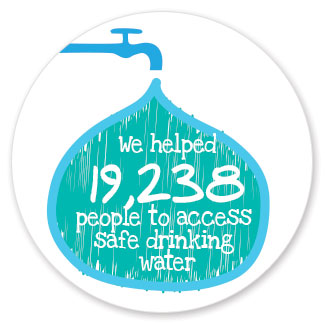Reaching beyond borders
Working through international Red Cross partners, we help to improve resilience and wellbeing starting in our region, which is home to two-thirds of the world’s population and includes the most disaster-prone countries on earth.

Coping with disasters and conflict
We worked to reduce the worst impacts of natural disasters by helping communities prepare, respond and recover as quickly as possible. When Typhoon Haiyan hit the Philippines in November 2013, our longstanding partnership with Philippine Red Cross meant that early warning systems were in place to evacuate people safely in Samar and Leyte; first aid kits were on hand to treat injuries; and local Red Cross chapters worked closely with government agencies to undertake damage assessments and distribute relief supplies. Across the Philippines, the combined efforts of the Red Cross Movement provided more than one million people with food, water, and other resources. In addition, Red Cross coordinated the international aid community’s efforts to provide shelter, a collective undertaking that saw close to a million people receiving emergency shelter materials or assistance rebuilding their homes.

We are working with 25 Red Cross National Societies to prepare for disasters to come. In Mongolia, we supported a national assessment of hazards and vulnerabilities in every province and district, leading many communities to take practical steps to reduce risk. We are also breaking down legal barriers to effective disaster response: we supported Vietnam Red Cross to advocate for a law to coordinate international assistance during disasters, which was passed this year.

Improving community health and wellbeing
Improving access to safe water and sanitation is a critical first step in improving community health, reducing child mortality and transforming the lives of women. Our 10-year partnership with Timor-Leste Red Cross has helped more than 10,000 families in rural villages to have safe drinking water, household toilets and a better understanding of hygiene.
We address both entrenched and emerging health issues in our region by using the volunteer networks of our partner organisations to promote sustainable behaviour change. Across the Pacific, this approach is increasing community understanding of diabetes, heart disease, tuberculosis and dengue. In Cambodia, our focus on maternal and child health resulted in pregnant women in four provinces being more likely to give birth in a healthcare facility. In Myanmar, our work with 14 communities saw a dramatic decline in cases of diarrhoea and malaria. In Tibet, Red Cross reached 100,000 people with information that led to improved hygiene behaviour, better understanding of child nutrition and more women giving birth in hospitals.

Red Cross volunteers went door-to-door during an outbreak of dengue fever in Timor-Leste to help people understand how to protect themselves. By strengthening Red Cross societies in the Asia- Pacific region, we ensure that well-equipped and trained networks of volunteers stand ready to help their communities to prepare for, respond to and recover from disasters. Photo: Australian Red Cross/Conor Ashleigh
Delivering quality programs with sustainable outcomes
A commitment to quality, diversity and child protection is evident in all our work. This year we completed evaluations of seven projects and contributed to a Pacific regional program review and a global evaluation of the disaster law program. Annual reflections, peer reviews and end-of-project evaluations are all in place to track progress, strengthen annual planning and ensure our work remains relevant and effective. For example, the mid-term review of the Community Based Health and Resilience project in Myanmar found that promotion of first aid was a successful entry point to build relationships and foundations at village level. Communities learned about preventing snake bites, malaria, dengue and tuberculosis as a starting point to have more complex conversations about health, water sanitation and hygiene. These findings and learnings from reviews and evaluations will be included in the design of the project’s next phase.

By volunteering with Red Cross, Sobhat and his neighbours in eastern Laos have taken a huge step to protect their families from water-borne illnesses. They have installed a water tank, taps and toilets in their village, and learned how to maintain their health through better hygiene. Photo: Australian Red Cross/Dilini Perera
Preparing for the future
We are mindful that the humanitarian landscape is changing rapidly, and we need to change with it. Our focus next year will be on strengthening partnerships; aligning our programs to complement each other at a country level; increasing our influence and advocacy in the humanitarian sphere; and ensuring our work remains demonstrably effective.
“The Australian Red Cross Society has played an active part in works of mercy in many lands - in the repatriation of war prisoners from Korea, in the resettlement of villages of Malaya, in aiding earthquake victims in Greece and by bringing comfort to the sick, wounded and distressed in Indonesia, Hong Kong, Japan and India.”
1953-1954 Annual Report


Let us know what you think
Any feedback or complaints about Red Cross or its work can be made at redcross.org.au or by calling 1800 811 700. Red Cross invites any feedback you may have regarding the Year in Review 2013/2014. Contact the editorial team at publications@redcross.org.au